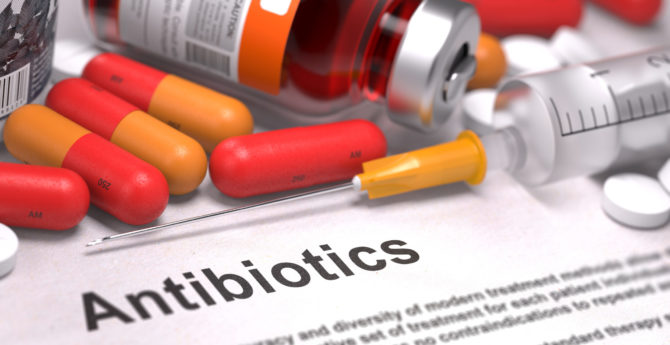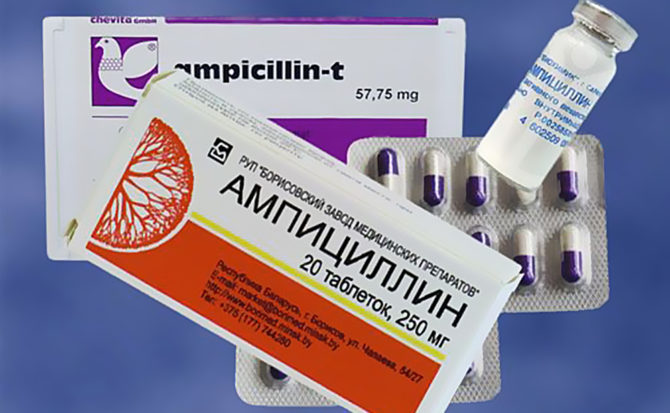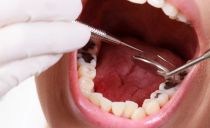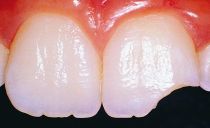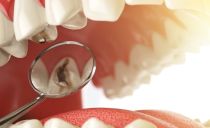Antibiotics for toothache: what to use for pulpitis, inflammation of the gums and teeth
The opinion that dentists prescribe antibiotics for toothache and other symptoms of inflammation is wrong. Drugs fight the cause of the disease - a powerful infection. Their effect on pain, redness and swelling is secondary.
Content
The use of antibacterial agents in dentistry
The indication for prescribing the antibiotic is not toothache, but swollen gums, an inflammatory process in the soft tissues of the cheeks and / or suppuration in the root of the tooth. These signs may be symptoms:
- gingivitis - gum disease;
- flux - an inflammatory process in the periosteum;
- periodontitis - periodontal inflammation (soft tissues surrounding the tooth);
- pulpitis - inflammation of the pulp of the tooth;
- alveolitis - inflammation of the hole after tooth extraction;
- periodontitis - an inflammatory process in the root of the tooth.
The main cause of these diseases is the reproduction of pathogenic microflora. It entails the release of toxins, to which the body reacts with inflammation in the oral cavity. The most common source of trouble is tooth decay. Acquiring a chronic form, it becomes a real breeding ground for harmful bacteria. And then it gradually turns into pulpitis - the last stage of inflammation, when there is still the opportunity to save the affected tooth. Starting from this stage, the doctor can prescribe a bactericidal drug in order to stop the inflammatory process in time.
Which antibacterial agent is better
The range of bactericidal agents approved for use in dentistry is very wide. Macrolides and penicillin preparations are mainly used. When prescribing the medicine, the doctor takes into account the age of the patient, the presence of chronic diseases of the kidneys, liver and heart, the severity of the inflammatory process.
Since any pills have contraindications and side effects, Only a doctor can decide which antibiotic is best for dental inflammation. Self-administration of antibacterial medications can be not only inconclusive, but also complicate further treatment.
With the incorrect selection of an antibiotic, bacteria develop resistance to its active substance. Subsequently, doctors have to use even more powerful means.
What antibacterial drugs are often prescribed by doctors for various inflammatory dental diseases, see the table:
| Cause of pain | Medications |
|---|---|
| Periodontitis |
|
| Alveolite |
|
| Flux and cyst |
|
| Pulpitis |
|
| Gingivitis |
|
| Periodontitis |
|
An antibiotic for tooth pain is not a primary medicine. Before a visit to the dental clinic, it is better to do the usual painkillers: Paracetamol, Ibuprofen, Ketanov.
Antibiotics for toothache of various etiologies - names and description
Choosing an antibiotic for signs of a serious inflammatory disease, the doctor focuses not only on patient data (age, allergies), but also on the spectrum of action of the active substances of certain drugs. In modern dentistry, a wide spectrum of drugs that suppress various strains of bacteria are used to treat inflammatory processes.
Amoxicillin
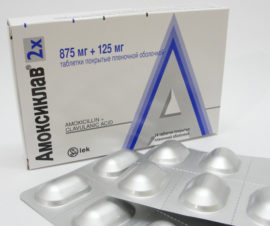 Amoxicillin and its derivatives (Flemoxin, Flemoclav, Amoxiclav, Augmentin) are often used in dentistry. The medicine belongs to the penicillin series, acts at the cell level, and prevents the synthesis of pathogenic bacteria. Amoxicillin proved to be excellent in gum disease, pulpitis, complicated periodontitis.
Amoxicillin and its derivatives (Flemoxin, Flemoclav, Amoxiclav, Augmentin) are often used in dentistry. The medicine belongs to the penicillin series, acts at the cell level, and prevents the synthesis of pathogenic bacteria. Amoxicillin proved to be excellent in gum disease, pulpitis, complicated periodontitis.
Amoxicillin for toothache is taken strictly as directed by a doctor. Only a doctor should determine the frequency of administration and the allowable daily dose.
Flemoklav and Amoksiklav contain clavulanic acid. Its purpose is to reduce the resistance of certain types of bacteria to the main active substance. In combination with amoxicillin, acid forms a powerful agent, so Flemoklav and Amoksiklav are used for toothache more often than the original medication.
Erythromycin
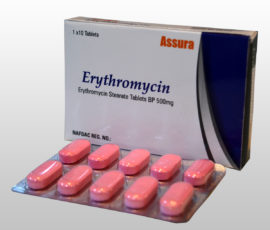 The drug belongs to the group of macrolides and acts on pathogenic microbes selectively. In special cases, erythromycin is more effective than Amoxiclav, as it is able to neutralize pathogens that are insensitive to penicillin. The medicine is often prescribed after pulp removal in the treatment of pulpitis.
The drug belongs to the group of macrolides and acts on pathogenic microbes selectively. In special cases, erythromycin is more effective than Amoxiclav, as it is able to neutralize pathogens that are insensitive to penicillin. The medicine is often prescribed after pulp removal in the treatment of pulpitis.
The peculiarity of Erythromycin is that it is unstably absorbed from the gastrointestinal tract, therefore it is better to drink such tablets 1.5 hours before meals or 2 hours after a meal.
Lincomycin
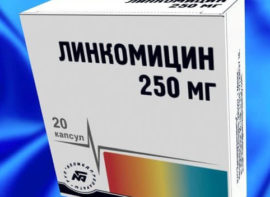 Linkomycin is based on the same principle of action. Stopping protein synthesis in a microbial cell, it has a powerful bactericidal effect.
Linkomycin is based on the same principle of action. Stopping protein synthesis in a microbial cell, it has a powerful bactericidal effect.
The substance belongs to the group of lincosamides, active against gram-positive aerobic bacteria. Lincomycin is often prescribed after tooth extraction to prevent suppuration and the development of inflammatory diseases. in the oral cavity. They also treat cysts using the drug in the form of injections.
Ampicillin
Another representative of the penicillin series - Ampicillin - a popular antibiotic for any dental inflammation. Most effective for flux, gingivitis.
Ampicillin is available in the form of tablets, capsules, dilution granules and powder for injection. Like most antibiotics used in dentistry for inflammation, the drug is prescribed in capsules and tablets. However, with an abscess in the gum or with a purulent process in the roots, the doctor can make a choice in favor of injections.
Digital
To suppress infection in the treatment of teeth and gums, antibiotics are the only way out. They allow you to stop the inflammatory process, without violating the integrity of hard tissues and gums. Cifran with its analogue called Ciprolet also belongs to such means. The drugs are very effective and are often prescribed for pain in the teeth covered with crowns.
The causes of pain under the crown are incompletely treated pulpitis, improper placement of the crown and late treatment at the clinic. In all situations, root injury occurs, suppuration, abscess begins. It is painful for the patient to chew; the tooth itself and the surrounding tissues hurt.
Tsiprolet and Tsifran are prescribed for toothache after an X-ray examination - when the situation under the crown is specified.
Doxycycline
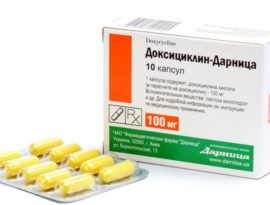 Doxycycline is a drug from the tetracycline group. Easily spreading in body fluids and tissues, the substance copes with a wide variety of infections. Doxycycline is the best antibiotic for inflammation of the tooth under the crown, with flux and gingivitis. In addition, it is prescribed in preparation for dental operations to exclude infection.
Doxycycline is a drug from the tetracycline group. Easily spreading in body fluids and tissues, the substance copes with a wide variety of infections. Doxycycline is the best antibiotic for inflammation of the tooth under the crown, with flux and gingivitis. In addition, it is prescribed in preparation for dental operations to exclude infection.
The peculiarity of the drug is a long-term effect. Compared with similar drugs, doxycycline acts almost twice as long. An additional plus is a pronounced decongestant effect: already after a day, the swollen tissue begins to return to normal.
Rules for taking antibiotics
With tooth pain caused by an inflammatory process, the antibiotic is prescribed in a course. Duration of admission can be from 5 to 14 days. What antibiotics to take with tooth inflammation and in what mode, the doctor will say. Before the appointment, you must warn the dentist:
- about cases of severe allergic reactions to any medications;
- about chronic diseases;
- About constantly accepted therapeutic agents (for determination of compatibility).
Since the effect of any, even the most effective antibiotic, for tooth pulpitis and other inflammatory diseases will begin only after 24–48 hours, it is better to warn the doctor about the presence of pain. If the jaw hurts, disrupting the usual rhythm of life, painkillers are indicated. They can be drunk for 5 days - until the suppression of the infectious process.
Important! After the disappearance of vivid symptoms (pain, swollen areas of the gums and soft tissues), some patients stop taking the prescribed medication. This should not be done - the course must be drunk to the end, otherwise the sore spot will continue to inflame with renewed vigor.
Another category of lovers of self-medication begins to take the drug in an increased dose from the first days of treatment. This is also unacceptable. Bactericidal agents have strong side effects and have a toxic effect on the body, so you can drink exactly as many tablets as the doctor prescribed.
Why and how to apply probiotics
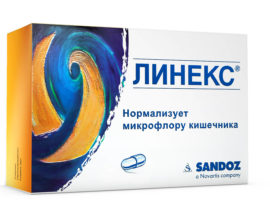 Given the tendency of antibiotic active substances to disturb microflora, in many dental clinics, probiotics that restore it are prescribed in parallel. The names of these drugs are known to everyone:
Given the tendency of antibiotic active substances to disturb microflora, in many dental clinics, probiotics that restore it are prescribed in parallel. The names of these drugs are known to everyone:
- RioFlora.
- Linex.
- Beefiform.
- Acipol.
- Bifidumbacterin.
The first dose of a probiotic can be taken before the start of treatment, and at the end of the main bactericidal course, you need to drink the medicine for another two weeks.
Antibiotic Compatibility with Alcohol
Alcohol of any kind is absolutely incompatible with antibiotics, so it should be excluded for the entire period of their intake. Hepatologists advise to wait with the use of alcohol-containing drinks and medications for at least 2 weeks after the end of antibiotic treatment.
What dental diseases do antibiotics apply externally?
In the presence of inflammatory foci in the tooth roots, as well as with pain under the crown, antibiotics are used internally. Outwardly, in the form of lotions and compresses, drugs are used for abscesses of the gums, opening of abscesses. Direct indication is gingivitis. Besides, Dentists use applications with bactericidal solutions after pulp removal with pulpitis - for additional processing.
Powdered tablets and tampons moistened with the composition are applied to the sore spot, which helps relieve pain and relieve inflammation. The purpose of the procedure is to maximally saturate with the medicine that part of the dental tissue that has become inflamed as a result of the spread of infection.
The effectiveness of antibacterial agents
Many dental problems are the result of infection, so antibiotics are an indispensable "weapon" of a doctor. For a single group of pathogenic microorganisms, there is a drug - each medicine shows a different indicator of effectiveness. Only the doctor is fully aware of this. The dentist knows which strain causes this or that infection, which remedy can neutralize it, therefore, medications should be taken only after consulting a specialist - it is safer and more effective.

